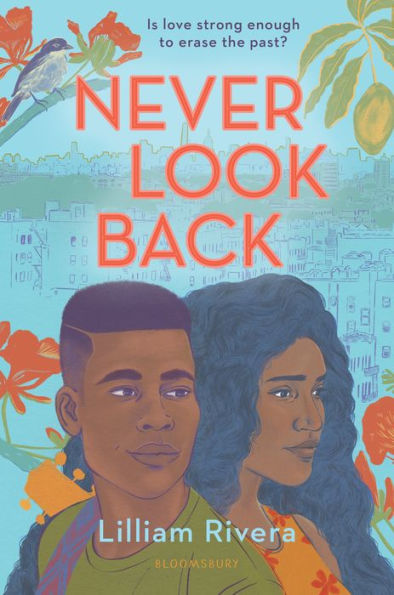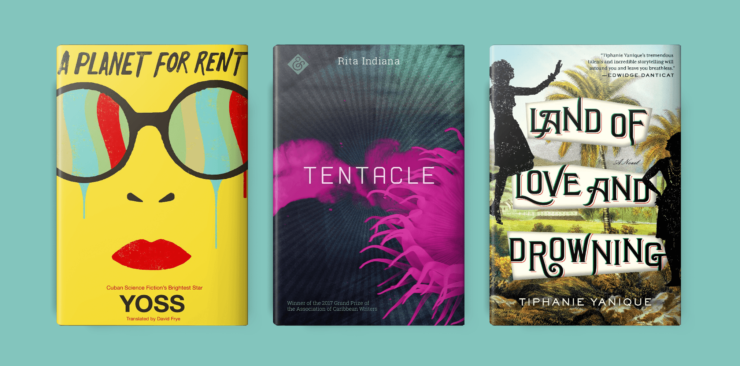An artist mutilates his body, repeatedly “dying” in front an audience composed of aliens. A man sits in a dining room table as guests argue over Goya and Velasquez, but he is also back in time forced to skin an animal by a 17th century pirate. Hooves peak out from underneath a woman’s skirt. In the center of this brutal dance is a Caribbean tale soaked in familiarity and truth.
There are a multitude of outstanding Caribbean literary voices with authors Yoss, Rita Indiana, and Tiphanie Yanique producing exciting works that stay with you long after you reach The End. What these three authors seamlessly do is combine the magical, the horrific, and the mundane as one. The speculative is not the absurd thing on the page, it is a matter of fact. It is a conversation of colonization, of what it is to be from las Americás, of other and otherness, and most importantly, it is about survival.
These three works respectively—Yoss’s Planet For Rent, Rita Indiana’s Tentacle, and Tiphanie Yanique’s Land of Love and Drowning: A Novel—not only inspire but also firmly stand alongside a stagnant canon that usually overlooks them. What makes me turn to these books again and again is how they tackle beauty and love with a backdrop that doesn’t sugarcoat the violence inflicted in the name of imperial domination. Their words have taught me how to find the poetic in the cruelty and to try express it in an intimate language of its own.
A futuristic Cuba is what Yoss (real name José Miguel Sánchez Gómez) presents in his translated 2015 linked, short story collection Planet For Rent. Here, readers encounter Cuba in 2024, colonized by an alien species with humans basically enslaved. The island is now an intergalactic tourist spot with sex work, immigration, and government corruption a plenty. There are so many scenes that stand out from Buca, the sex worker waiting for a trick in the story “For Rent, One Planet” to the Voxl game that’s a sort of World Cup played with species in the story “Champions.” But the crux of the book can be found in the horrific chapter “Mestizos” where a human artist mutilates his body in a violent performance piece in order to live a privilege life. “Behind the flesh and blood of emotions, the skeleton of theories and grand schemes is laid bare, the subtle framework of sex and power in mixed substrates,” the artist says. The question Yoss raises is how much can humans withstand in order to live?
Rita Indiana’s 2015 Tentacle is a slim, shapeshifting dystopian tale told in three time spans and set in the Dominican Republic. Readers are introduced to Acilde Figueroa who works as a maid and a rent boy, trying to save money for a gender assignment. Acilde eventually learns they’re the chosen one who must travel back in time to convince the president not to commit ecological disaster, saving humankind. Meanwhile, in the present time, a pretentious art student Argenis finds himself living in two time frames, the colonial past with pirates and the present. It is in this thread where Indiana’s hilarious and heartbreaking reality takes off, where self-serving, Neo-liberal conversations are identical to ruthless pirates. “The two suns didn’t compete for his attention, instead appearing one on top of the other, like stacked negatives.”
There are so many scenes from Tiphanie Yanique’s 2014 novel Land of Love and Drowning: A Novel that replays in my head from time to time. The epic story centers on the Bradshaw family and the two sisters Anette and Eeona in a 1916 to the 1970s Virgin Islands, a place right at the edge of modernity. Although Yanique’s vibrant prose is ripe with magical realism, the most radical moment in the novel always centers around the ocean, specifically the moment when Anette and her lover Jacob bath in the beach. “But they felt ancient and natural, like they were, just tonight and just here, alive in a time before Americanness. A time before any kind of ness.” Those lines echo the theme each of these three works presents.
Buy the Book


Never Look Back
In my forthcoming young adult novel Never Look Back, I wanted to find a way of writing about generational trauma and the ravages of Hurricane Maria on Puerto Rico. As I watched our government deny the amount of deaths on the island because of their neglect, I needed to find a way to translate my rage into words. I used the Greek myth Orpheus and Eurydice to be my structure, the house to place this horror in. Set mostly in the Bronx, New York, Never Look Back introduces readers to Eury, displaced from her home of Puerto Rico because of the hurricane, is being followed by an angry spirit when she meets Pheus, a Dominican American who spends his time freely serenading the girls with bachata without seeing the repercussions of his actions.
In Never Look Back, there is a real clash between the seen and the unseen. It is as if being in the United States has stripped many of their beliefs in the supernatural. The true speculative lies on the denial of these elements, the horrors done by man in the places we’ve left behind, and the injustices continue to be perpetuated right now. “Surviving the streets every day is a miracle. How does logic play in to the everyday terrors we are meant to overcome?” Can the alchemy of music and love be enough to save them, to save us?
Great fiction is a time traveling vessel. It reaches back in history, twists the original narrative, and place it back into a new framework. These books have found ways to speak of the Caribbean experience and bring a fresh new take to writing the fabulist and the profane and we are all the luckier.
Lilliam Rivera is an award-winning writer and author of the young adult novels Dealing in Dreams, The Education of Margot Sanchez, and Never Look Back. Her work has appeared in The New York Times, Elle, Lenny Letter, Tin House, Nightmare Magazine, and Magazine for Fantasy & Science Fiction, to name a few. Lilliam grew up in the Bronx and currently lives in Los Angeles. Visit her website or find her on Twitter @lilliamr.










